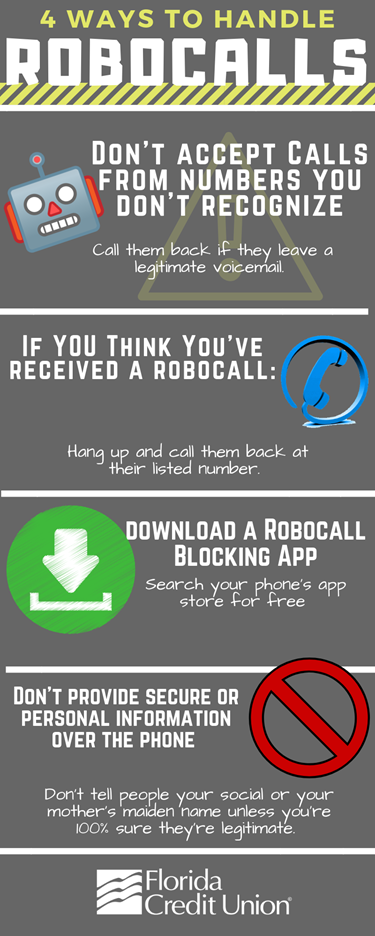What Are Robocalls & How Do I Stop Them?
4/15/2019
4 min. read
By: FCU Team
When your phone rings, do you even bother to answer? Probably not unless you recognize the number. If an unknown caller comes across your screen, chances are you’ll send it straight to voicemail.
Nowadays, contacting your phone means accessing you 24/7. This type of all-hours accessibility is ripe for businesses, collectors, and scammers to use to try and get to you and your money.
The New York Times reported that “robocalls” reached an all-time high in 2018 at over 48 billion calls in the U.S. alone. These automated phone calls are a nuisance to almost everyone. According to a recent survey, over half of respondents reported receiving an average of at least one robocall per day.
The proliferation of these phone calls are the result of Voice-over IP (VoIP) technology, a type of web-based tech allowing users to place calls via the internet. They can use any phone number of their choosing. These types of calls are known as “neighbor spoofing” because the number resembles someone from your area. That's why people in Florida get calls from 352 and 954 area codes, but people in California, for example, or elsewhere, get them from their own local area codes.
Scammers sometimes will take this one step further by using the first three digits of a person’s phone number. In this case, the idea is to trick the recipient into thinking it’s a phone call or message from their own phone in order to get them to pick up.
Types of Robocalls
The most common types of robocalls are calls designed to keep you on the phone and engaged in conversation long enough to garner information and/or financial commitment from you. In 2018, the neighbor spoofing type was most common of scam phone call.

Other common types of calls attempt to impersonate government agencies or federal services. For example, fraudsters often call claiming to be from the IRS, telling the person on the other side of the line that they (falsely) owe thousands of dollars in taxes, which must be collected under threat of penalties such as jail time.
Another such example claims to offer discounts on health insurance, only to use the information phished to steal the person’s identity.
These scam calls are dangerous and should be avoided completely. If you hear anyone claiming to offer unsolicited goods or services through a suspicious and unexpected phone call, it’s best to hang up and block the number.
Not all robocalls are scams. Many are just automated messages from political action committees, schools, churches, businesses, and collection agencies. All of these legitimate robocalls must adhere to the federal do-not-call list, which prohibits unsolicited phone calls to those registered on the list.
What Can I Do To Stop Robocalls?
As mentioned, the Federal Trade Commission operates a do-not-call list known as the National Do Not Call Registry. The registry is freely available to all U.S. citizens and residents. You can register your phone online at this link, or call 1-888-382-1222.
Companies have up to 31 days to acknowledge your addition to the registry by stopping the calls to your number, but this isn’t a guarantee that calls will stop completely. Only phone numbers you register to the list will be free from legitimate phone calls, meaning that if you register your cell phone, for example, robocalls can still reach your home phone and landlines.
Scammers and other illegal callers will not necessarily adhere to the rules. If this occurs, you can contact the FTC with a complaint. There are a number of free apps available for smartphones that will block calls that were placed using VoIP technology. If you decide to use an app, make sure it is free and doesn't request your credit card information.
It’s frustrating to not be able to answer your phone, and even more so to be bombarded with annoying calls.
By registering your phone with the FTC’s National Do Not Call Registry and ignoring calls from numbers you don’t recognize, you can significantly cut down on this annoyance. People legitimately trying to reach you will leave voicemails and a way for you to reach them.
Perhaps the best way to avoid these calls, ultimately, is to put your phone away for a while and let it all be out-of-sight and out-of-mind.
Get more information on how what you can do to protect yourself from fraud.

